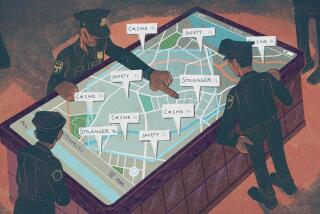Ad Agency, Police Sources Say Kolender Released Names of Block Watch Leaders
- Share via
Former San Diego Police Chief Bill Kolender personally ordered that a confidential mailing list of Neighborhood Watch captains be released in 1986 to a private advertising firm promoting a tax increase to build new jails, according to the ad agency and three highly placed police sources.
The list ignited a controversy in the San Diego Police Department this fall when it resurfaced in a political campaign, and some block captains complained that the Neighborhood Watch program was improperly being used for political purposes.
Chief Bob Burgreen, who recently succeeded Kolender, apologized that the list had been released for political purposes and ordered an investigation into how it got out.
Denies Wrongdoing
Kolender, now an assistant general manager for community relations at the Union-Tribune Publishing Co., denied Tuesday that he ever violated the confidentiality of the list before he retired as police chief this summer.
“I know nothing about the list,” he said. “That all happened after I left.”
But Joe Charest, executive vice president of Gable Agency, and three independent police sources, who spoke under the condition that they wouldn’t be named, said Kolender was instrumental in releasing the confidential list.
Charest said his agency was promoting a ballot proposal for increased jail funding in 1986 and, because of tight campaign finances, turned to Kolender for help in garnering support.
“A lot of people were trying to help because there wasn’t a lot of money and it was a real grass-roots type of campaign,” Charest said.
Meeting About List
The police sources said Kolender attended a meeting of his top command in which they discussed the request by the Gable firm for a copy of the names and addresses of the block captains. Because the block captains traditionally back law enforcement efforts, it was thought that the list would be helpful in drumming up support for the jail tax proposal.
But the consensus among Kolender’s top commanders and deputy chiefs who attended the meeting was that the list definitely should not be released, the sources said.
They pointed out that when block captains join the Neighborhood Watch program, they are promised by the Police Department that their names will
remain confidential. And some block captains, in interviews this fall, said that the confidentiality is crucial for them because of their work against crime in their own communities.
List Released
The meeting ended with Kolender’s assistants assuming that the mailing list would remain confidential, the sources said. But they said that, after the meeting, Kolender directed one of his subordinates to release the list to the advertising agency.
The subordinate followed that order.
Charest said he did not recall who specifically in the Police Department gave them the list. But he added that the list came “from Kolender, through one of his sources, because we do recall that Kolender offered to help.”
As it turned out, the jail tax proposal failed that year.
This fall, block captains were again targeted with political mailers, this time seeking their support for Proposition G. That ballot measure, which called for the weaker of two police review boards, was approved by voters in November.
After that mailing, the Police Department began an internal investigation into how the confidentiality of the mailing list had been breached. The probe eventually led to the Kolender subordinate who told police investigators that he had released the list in 1986 after being ordered to do so by Kolender.
However Kolender insisted Tuesday that he did not remember attending the command staff meeting in which the block captains’ list was discussed. He also said he did not order a subordinate to release the list.
‘Do Not Recall Meeting’
“I do not recall that meeting,” he said. “I was not involved in anything like that.”
Chief Burgreen has refused to publicly discuss exactly who turned loose the mailing list, except to acknowledge that it was released in 1986 through a San Diego police official and not through the Police Officers Assn.
Burgreen had originally assumed that the police officers union had somehow obtained the list, because the Proposition G mailers sent to the block captains were signed by POA President Ron Newman.
But Newman has said the names and addresses for the mailers were compiled from rosters maintained by several “consulting groups” that were working with the police union on behalf of passage of Proposition G.
Charest said his firm put the list in storage after the 1986 jail campaign, where it has remained.
More to Read
Sign up for Essential California
The most important California stories and recommendations in your inbox every morning.
You may occasionally receive promotional content from the Los Angeles Times.














